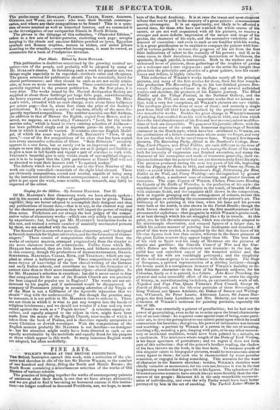Singing for the Million. . By JOSEPH MAINZER. Part II.
Of Mr. MAINZER'S first elementary work we have already spoken ; and to his second a similar degree of approbation can be given. Taken together, they are better adapted to accomplish their designed end than any publications of recent date,—that is to say, in the clearest way and by the shortest practicable process they will impart the power of reading from notes. Proficients are not always the best judges of the compa- rative value of elementary works—which can only safely be ascertained by experiment; but, having put Mr. MAINZEleS instruction-books to this test, and trained a certain number of musically uneducated persons by them we are satisfied with the result. The Second Part is somewhat more than elementary, and " is designed to furnish materials for higher cultivation, and for the formation of chorus- singers." These consist of compositions chiefly selected from the works of eminent masters, arranged progressively from the simpler to the more elaborate forms of counterpoint. Unlike those which Mr. MILLAR has selected, they are little known, and hitherto unattainable in this country, though the productions of ALBRECHTSBERCER, Gmoust, SCHNEIDER, MARCELL°, CASALI, Rum, and TELEMAN j which are sup- plied at about a halfpenny per page. These compositions will impart some degree of knowledge of the best choral-writing of the German and early Italian schools, and contribute no less to the formation of a correct taste than to their more immediate object—choral discipline. So far Mr. MAINZER'S selection is excellent: but did it never occur to him that compositions for the use of the Romish Church are not precisely the best adapted for popular use in England ? The words are not un- derstood by his pupils, and if understood would be disapproved. A company' of Protestants joining in seeming adoration of the Virgin or of the Host is not a fulfilment of the Apostolic injunction that we should " sing with the understanding." But though the practice may be innocent, it is not politic in Mr. MAINZER thus to enforce it. These are not times in which it is wise to put any weapon into the hands of religious intolerance ; and we should not wonder if a hue and cry were raised against the work as a " Popish device." A selection equally ex- cellent, and equally adapted to the object in view, might have been made. from the music of the English Church, nine-tenths of which is taken from the book of Psalms, and is therefore equally acceptable to every Christian or Jewish worshiper. With the compositions of the English masters probably Mr. MAINZER is not familiar—no foreigner is : but his attention might easily have been directed to such as are equally unattainable by the multitude and equally fitted for his purpose as those which appear in this work. In many instances English words are adapted, but often unskilfully.


























 Previous page
Previous page